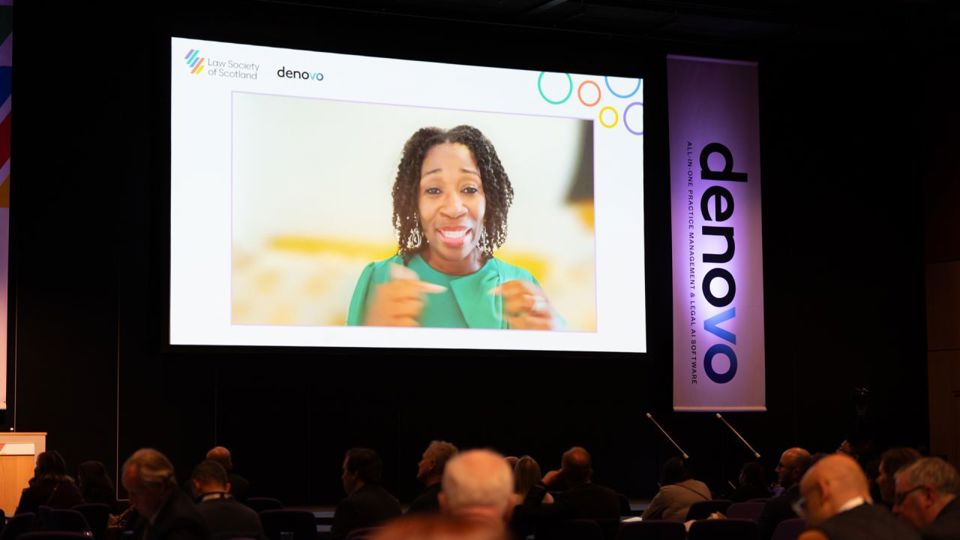'Why what we do matters' — Law Society of Scotland Annual Conference 2025 Report

AI, mental health and wellbeing, and the ethical principles which underpin the entire legal profession dominated the four days of the 2025 Law Society of Conference Annual Conference.
Why do people obey the law? Not, as Judge Victoria Pratt eloquently puts it, for fear of consequences but because they are treated fairly. Dignity, respect and fairness are core tenets of the legal profession, the American criminal justice reform advocate tells delegates at the Society’s annual gathering.
Judge Pratt’s keynote address to close the fourth day of the event hosted at the Edinburgh International Conference Centre came just days after the rule of law in the UK was once again called into question.
The former chief judge of the Newark Municipal Court in the United States, gave the final keynote address, outlining how she had brought an approach based on kindness and respect to her courtroom work.
She said: “You should bring everything and everything that you are to your practise, to whatever the profession is and that is what changes systems, that is what justice looks like. People are more satisfied with the justice system, whether they win or lose.”
It was a fittingly reflective conclusion to four days of discussion and debate during which Scottish practitioners grappled with an uncertain technological future and their place in it, with questions of wellbeing and sustainability in the workplace, and with prompts to consider its place in society.
Early that day, Guy Beringer CBE, KC – chair of the British and Irish Legal information Institute and former Allen & Overy senior partner — spoke about the importance of solicitors considering the profession’s public standing and contribution to the public good rather than focussing only on immediate self interest.
Mr Beringer told the conference: “This isn’t just about one segment of the profession. It’s not about large commercial firms or smaller firms separately. It’s a collective issue.
“This is a challenge which must be met by leadership from the firms themselves. If they rely on regulators to tell them what to do, they’re halfway to losing the public trust which underpins their privileged and profitable position… The status of the profession is in the hands of the law firms themselves.”
Day 1 - AI in Your Workplace
Legal education should offer more practical AI training to bridge the gap between what law students are taught and what’s expected of them in the workplace.
Helena Siebenrock, a trainee solicitor with CMS Cameron McKenna, said: “There's a massive shift from the university level to practice.
“Trainees are actively encouraged to engage with legal tech tools; the expectation shifts from ‘No, you can't use AI’ to ‘You should use AI’. Trainees need to become familiar with AI tools quickly (for example, learning how to prompt) as well as their risks and limitations.
“However, we need to be careful trainees don't over-rely on AI. A lot of training tasks can be done using AI, but that's not a reason to switch off. You need to be mindful that using AI does not substitute using your brain.”
Ross Kilshaw, of Cullen & Kilshaw Solicitors, said his firm had used Microsoft Co-Pilot quite widely at a high level in 2025, and found it very useful: “It can give quick answers to queries and help set out a framework. If you drag in a title sheet and give it a prompt [we created a prompt with about 15 lines of query], it will produce a nice report. We pulled in a 40-page commercial lease, and within about 30 seconds, it pulled out really helpful information and we were able to go back in and ask more specific queries.
“We’re taking a ‘pinch of salt’ approach, and not relying on anything it's producing, but carrying out further research. But you get from a blank page to something really helpful to work on.”
Phil Hall, Managing Counsel in the Outsourcing, Technology & IP legal team at NatWest Group, said his team found AI useful for productivity improvements, assistance with core legal tasks, and providing “another voice in the room”.
He explained: “AI tools can provide a dispassionate response, and be a Devil's Advocate - playing a ‘challenger’ role to a problem, coming at it from a different perspective. Also, they sometimes help with storytelling, delivering a more impactful point.”
Hall said NatWest’s strong governance and security meant there was a very safe space to “play around” with use cases, likening it to a soft play centre where you have a safe landing if things don’t work out. He added: “The issue that we've got isn't so much around safety and security, but removing scepticism or concern - ‘The sky is going to fall in if I get this wrong’ or ‘I've got very good processes in place, I don't need to use this’.”
Steven Hill, Managing Director of Denovo, urged legal firms to start using AI in “boring and predictable” areas integrated with existing processes or case management systems - so outputs could be checked: “Start with a small pilot and measure it - did you save time? What was the quality of the output, what still needs a human touch? We have tools where there is a human verification element.”
He added: “If it's really good at small tasks, try it on a heavier task to see how it performs,” and stressed: “Don't chase tools, chase outcomes. Look at your problems first and identify the pain points you have.”
Emily Spooner of Wordsmith, said legal firms were “really engaged” with AI, but at very different stages: “It's changing very quickly, but it's never too late to get on board. Some firms are asking for ad hoc help, for research and drafting, but there’s another level where people have more sophisticated requests to get AI involved in the whole workflow.”
In terms of an AI jobs threat, Ross Kilshaw said: “Our layers are interested what AI can offer, and not scared it's going to take jobs, but I think that may well come.”
Phil Hall sounded a note of caution: “The private practice model is fundamentally based on time spent on a matter. AI is a way of gaining efficiency and helping people spend less time, and that’s a problem because I think it undercuts a lot of private practices’ [working] model. It's an eye-opener for private practice firms, something for them to ponder.”
Day 2 - Intergenerational Working
Law firms now employ a “six-generation workforce”, spread from Generation Alpha through to the “silent generation” of octogenarians, who still hold many very senior positions globally. That was the stark message in the introduction to a panel discussion on intergenerational working.
Jamila Archibald, senior counsel at travel website Trip and winner of the 2025 Law Society of Scotland in-house rising star award, kicked off the discussion by explaining that the coronavirus pandemic lockdowns had driven younger lawyers to build resilience, but had also deprived them of the opportunity to “learn by osmosis” from more-experienced colleagues in offices. Instead, younger lawyers had to find opportunities to learn online, such as shadowing senior colleagues on video calls.
Drawing on her previous knowledge as student experience director at Edinburgh Law School, Lindsay Jack – the Law Society of Scotland’s head of diversity, careers and outreach – highlighted that the amount of information available about firms on the internet had led to “decision paralysis” for many candidates. She underlined a shift away from candidates asking “Who will have me?” to asking “Where do I want to be in my career?”, with younger lawyers weighing up questions about law firms’ ethics, environmental priorities, and attitudes towards mental health.
Sarah Lonie, a director at Anderson Strathern, reflected on how environmental sustainability and diversity, equality, and inclusion (DEI) had become even more important topics while she was away from her office on maternity leave. “The junior generation are more likely to experience climate anxiety,” she added – joining a law firm that is reducing its environmental impact may give them back a sense of control.
The benefits of reverse mentoring – in which junior members of staff mentor their senior colleagues – were highlighted by Rajiv Naik, a partner at Fragomen. He underlined the need for “strong psychological safety in the workplace” and a focus on clear communications, so that all members of staff felt comfortable to speak about their experiences.
“I’m the gap,” confessed Louise Levene, international asset services manager at Finders International, explaining that she had joined the industry when fax machines and microfiche readers were still prevalent. While much of her job now involves using computer systems, she highlighted the benefits of hiring people with both analogue and digital skills, which helped them to find information not easily available online.
That need for a mix of skills struck a chord with Archibald, who described herself as an “AI optimist” when it came to using artificial intelligence. “There’s a fear of it replacing lawyers altogether, but I see it as ‘Lawyer-plus’, with AI streamlining administration, so lawyers can solve complex problems and advise clients,” she said.
Naik underlined the need to move away from hierarchical structures. “It’s not about old versus young or vice versa – it’s about curiosity and certainty,” he added. “The firms that can thrive are the ones where every generation feels both heard and stretched, because everybody has something to bring to the table.” Naik and other speakers said the key to addressing this was honest, open and high-quality communication within an organisation.
Day 3 - Getting Ready for the Next 10 Years
What keeps legal practitioners up a night when they think about the decade ahead? A tough question, and the next 10 years was a provocative and challenging discussion topic for the third day of the annual conference.
The session pulled together key themes from the proceeding days: attendees and panellists alike wanted to share and hear the cases for and against great AI integration into the profession. What’s more, there was discussion of the next generation of both solicitors and clients and how practice will evolve.
At the heart of the session was the question of whether being a solicitor would look the same in 2035 as it does today. The mix of optimism and pessimism from delegates was striking, but there was a loose consensus that the relationship-management and people skills so vital to legal practice will only become more valuable in an increasingly tech-driven market.
Rob Aberdein, group managing director at Simpson & Marwick, emphasised the need for the legal profession to embrace technology to stay relevant in a rapidly changing work. He suggested new developments are a massive opportunity to optimise services, improve the client experience and boost growth and profitability. Trish van Soesbergen, ESG lead consultant for Landmark, echoed his remarks, focusing on the possible increased efficiencies and reduced burden of administrative tasks which AI integration can offer. This, the panel agreed, could free up more time for lawyers to focus on their client relationships. Abbie Black, senior client operations manager with tech provider Amiqus, highlighted the need for firms to support and upskill trainees to use the new technology on offer in the practice.
ESG requirements and the importance to clients was also a topic which energised the speakers. Trish, an expert in the field, outlined the trajectory of ESG requirements over the past few years including the CSRD and STFR in the European Union. Data management and senior partner buy-in and leadership were both cited as vital for firms wishing to stay ahead of regulatory changes and position themselves well.
“Greenhushing”, flagged by Trish, is a growing trend in a world dominated by populist politicians like President Donald Trump who rubbish the principles of ESG. Nevertheless, firms are pressing ahead with meeting ESG requirements and improving their green credentials behind the scenes.
On the issue of what a practice and client relationship of the future will look like, Rob concluded: “We as consumers want friction removed. We wanted value added. We want processes to be slicker and spend less time and money on meeting, giving and speaking to advisors.
“Clients will gravitate towards that because they don’t need four advisors, they need on platform.”
Breakout sessions on Day 3 included: Ethics – Acting in the public interest led by Professor Stephen Mayson from UCL Faculty of Laws during which he proposed the idea that all solicitors are employed in a public profession, contributing to wider social bond with the rule of law and fairness. Society President Patricia Thom was involved in the second breakout pane, on Legal Aid and assessing the future of access to justice; and finally a session with Sophie Campbell, an associate from CMS, about legal professional privilege.
Day 4 – Full day at Edinburgh International Conference Centre
The critical importance of the rule of law and ethical considerations for the legal professions were central themes at this year’s Law Society of Scotland Annual Conference
The flagship event concluded yesterday with a packed agenda, as around 1,000 Law Society members and others attended either online or in person at the Edinburgh International Conference and Exhibition Centre.
Law Society Chief Executive Ben Kemp told delegates: “We do a lot of work around the rule of law, a topic that has of course become ever more pertinent and relevant in today’s society, something that we no longer I think in today’s world can take for granted.”
Law Society President Patricia Thom outlined the valuable role that solicitors can play: “We’re all ambassadors to our profession and likewise we can be champions to our communities by standing up for the rule of law. The same is true for access to justice, another vital topic that has been discussed this week.”
The rule of law was discussed further in a session featuring representatives of the International Bar Association and the American Bar Association alongside legal academic Professor Tom Mullen from the University of Glasgow.
American Bar Association President Michelle Behnke said: “Don’t take the rule of law for granted. It’s really important that we as lawyers, solicitors, that we remain engaged with the rule of law. Teaching about it, talking about it and, in our associations, advocating on its behalf.”
The importance of ethics and working in the public interest was also discussed, along with topics including wellbeing and mental health, technology and innovation, and regulation.
The 2026 Annual Conference will be held on October 29 next year.



























